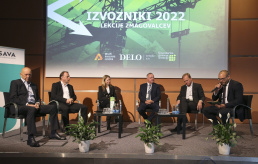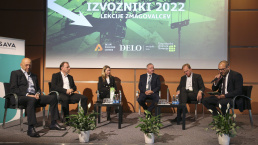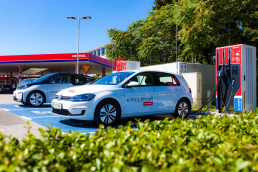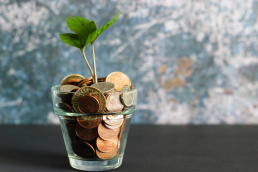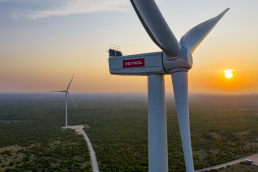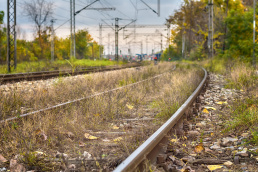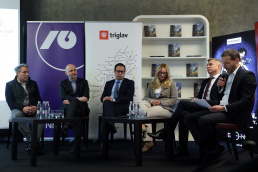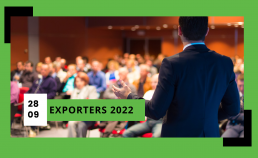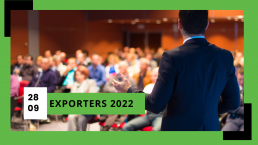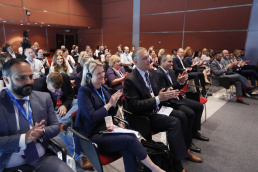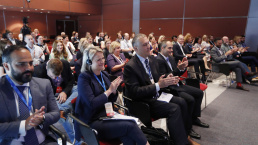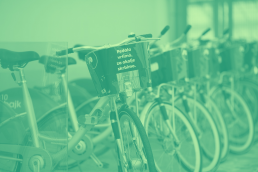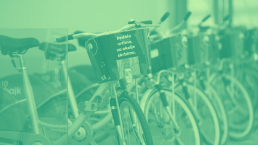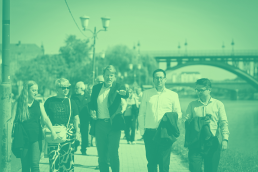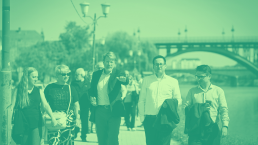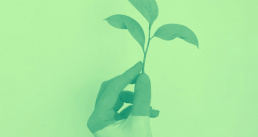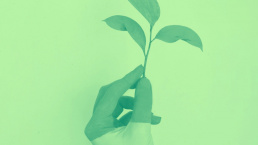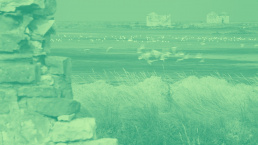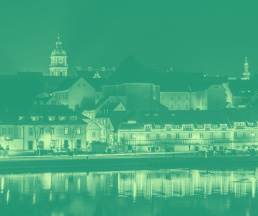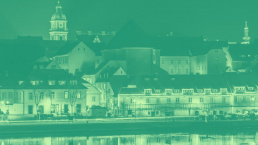EXPORTERS 2022 business conference
Exporters 2022
editor
Adriatic team
Ljubljana, September 28, 2022 - Labor Business Exporters 2022: Lessons from the Winners.The business conference was opened with welcome speeches given by Bojan Budja, Editor-in-Chief of Delo Media House, Mag Aleš Cantarutti, General Director of the Chamber of Commerce of Slovenia, Dr Jure Stojan, Director of Development and Research at the Institute for Strategic Solutions and Matjaž Han, Minister of Economic Development and Technology.
The conference focused on risk management during one of the most turbulent and uncertain periods in recent history. Directors of the most successful Slovenian companies and foreign guests from the sphere of economy, finance, diplomatic relations and associates from neighbouring countries discussed ways of managing risk during the three recent global shocks. The question was asked, are there opportunities for the Slovenian economy in this rapidly changing environment? Marjan Drmota, Director of Kolektor Mobility emphasised that if electricity prices continue to rise, companies will only have to work harder to cover their costs. Tibor Šimonka, Vice President of Sij and President of the Chamber of Commerce of Slovenia, added that the high cost of energy could also cripple the Sij group, and that Slovenia is now importing energy from countries that have cheaper energy sources, but are significantly worse in terms of carbon emissions than suppliers from the EU. He was also convinced that if the conditions regarding energy output change significantly, the Slovenian economy will have big problems and the forecasted results of Slovenian export companies will no longer be realistic.
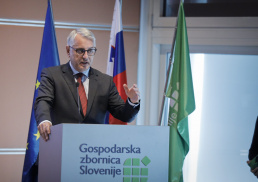
In the long term, dependence on non-EU suppliers will diminish.
Dr Alexander-Nikolai Sandkamp, Professor of Economics at the University of Kiel and a researcher at the Kiel Institute for the World Economy, noted that the economy is currently facing two major challenges, the pandemic and the war in Ukraine. He argued that giving up dependence on Russia is feasible for the EU. The scenarios prepared at the university show that if dependence on business with Russia were to be broken, imports and exports would decrease, and production would move to other locations outside of the EU. In addition, the division of work and specific skills would decrease, while production costs for semi-finished products would grow. As a result, reducing dependence on Russia could work, but exports would suffer, and Slovenia, as an export-oriented economy, would certainly feel the pain, he said. They should strengthen their resilience by connecting with several different suppliers in different regions, with enhanced storage strategies and recycling, which would reduce raw material dependance. The EU must strategically plan its reserves and strengthen international relations as well as removing trade barriers, Professor Sandkamp stated.
The Anti-crisis Recipe: Big Projects that Keep the Momentum Going.
How to Manage Risks During Three Global Shocks was moderated by Dr Slobodan Šešum from the Ministry of Foreign Affairs.
Nuša Pavlinjek, Director of the company Roto, explained that Roto is overcoming broken supply chains by recycling, with as much as 70 percent of their products containing recycled materials. They have new products prepared in advance for the market, which enables them to respond and adapt quickly to new conditions. They have also increased product diversification by cooperating with different industries and regions. They are increasingly visible on the African market, where they are already doing business in 11 countries.
Julijan Fortunat is a Strategic Consultant in the Wietersdorfer Group, which is the majority shareholder of Salonita Anhovo, a construction company that is energy intensive. He said that the petrochemical products used in construction processes cause them headaches. Their supplies have been greatly diminished and they need to find new solutions to the crisis by themselves. The reduced consumption of electricity will have dramatic impact on their business, and the strategy to prevent bankruptcy will be dependent on the company’s large construction projects having a stabilising effect, according to Julijan Fortunat.
The President of the Board of Sava Re, Marko Jazbec, said that the year 2022 has already brought a number of new problems, which correspond to pre-pandemic levels and high inflation. The insurance industry is not among the winners of this period, many insurance products are no longer attractive. The US, for example, will fight inflation by slowing down the economy, which will include a recession, which is more daring than what the European Central Bank is doing, Marko Jazbec stated.
Marjan Drmota, Director of the company Kolektor Mobility, which is part of the Kolektor Group, notes that although the characteristics of the crises are similar, the world is constantly changing, so past experience cannot just be simply mapped onto the present day. It is always necessary to look for new and innovative solutions, he emphasised. In the future, the impact of energy on industries could be increasingly problematic. At Kolektor Mobility, energy accounts for 2.5 percent of total costs, which means 10 million euros per year of the company’s costs. The price of energy could double or triple, but if it quadruples, it means that electricity costs will negate any profit whatsoever, M. Drmota warned.
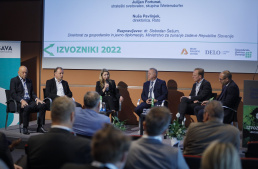
Deglobalization is not only a Threat, it is also an Opportunity.
The data shows that Slovenia is strengthening the added value of exports, the key to improved export results is the trade and service exchange of our country within the EU area, said Bojan Ivanc, Chief Economist of the Chamber of Commerce and Industry. In 10 years, Slovenia has increased exports to EU countries by around 15 billion euros, this year is estimated to peak at 33 billion euros.
According to Rok Capl, Acting Director of the public agency, SPIRIT Slovenia, an important factor for local companies is assistance in finding new foreign markets. At Spirit, they can promote and strengthen the visibility of Slovenian companies, as companies that can offer foreign partners alternatives to achieve business goals.
Saša Keleman, Executive Director of SID Banka, which supports Slovenian exporters with financial tools, emphasised the fragility of today’s global equilibrium, highlighting the prices of energy products, the availability of raw materials and inflation. All of these factors bring advantages and opportunities as well as disadvantages to small businesses, and at the same time, deglobalization is taking place, which again brings forth both opportunities and threats.
Eva-Ricarda Willems, Deputy Ambassador and Head of the Economic Department at the German Embassy, presented a forecast predicting that the economic situation in Germany in the coming period, will be analogous to that of the other European countries. The economic conditions in Slovenia and Germany are similar, which is the result of the countries strong connection in production and development.
According to Serenella Marzoli, Director of the Agency for the Promotion and Internationalisation of Italian Companies at the Department of Economic Promotion of the Italian Embassy, stated that Slovenia is an important partner of Italy. Slovenia usually helps between 300 and 350 Italian companies interested in doing business with Slovenia. Cooperation between the two countries did not stop even during the pandemic, the reason being proximity, historical ties and the good business environment in Slovenia, in addition to research and development and a circular economic. An important anti-crisis approach for Slovenia could also be a blue economy, which is relevant mainly for maritime countries, but could also apply to Slovenia.
Alenka Hudek, Minister Plenipotentiary at the Embassy of the Republic of Croatia, said that entrepreneurs from Slovenia and Croatia know each other and cooperate well in business. It is expected that the business relationship will improve further with Croatia’s entry into the Euro area. She also sees opportunities in the field of infrastructure and energy.
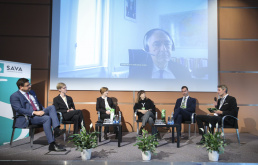
About Proper Business Etiquette.
The shock of recent years have completely changed the world and what is permitted to do or say, and what is not. In the final part of the event, Dr Jure Stojan, Deputy Mayor of the Municipality of Ljubljana, Tjaša Ficko and Janez Škrabec, Director of the company Riko pointed out behaviour, that, in their opinion, do not belong in the business world, but that people revert to more and more these days. For example, men wearing suits without a tie, being unpunctual, contentious topics are amongst the many mines in todays business world. There are rules that should not change and must be preserved. It is also important to remember that when you compete in the business world, you should treat your fellow human beings with courtesy and respect, as it is a small world and you may encounter these people again, in very different circumstances. Therefore, it’s very important to build and maintain good relations at all times. Tjaša Ficko also emphasised that when travelling abroad, one must adapt to local rules or as the saying goes, “When in Rome, do as the Romans do.”. Janez Škrabec added that it is important to be curious and interested, but not judgemental and to be free of preconceptions and prejudices because people can feel the negative energy.
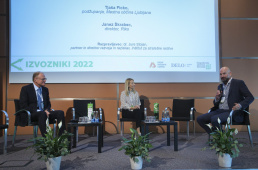
Business conference EXPORTERS 2022
Exporters 2022
editor
Adriatic team
On 28 September 2022, the media house Delo, together with the co-organizer Chamber of Commerce of Slovenia and the Institute for Strategic Solutions (ISR) as a program partner, is organising a business conference EXPORTERS 2022 entitled "Lessons from the Winners". The event will feature three panel discussions, covering risk management in times of three global shocks, the opportunities for the Slovenian economy in a changing environment, and international business relations as well as new trends in global business etiquette.
Successful Slovenian entrepreneurs and businessmen will gather at the conference and share their views on management during the global crisis, as well as the risks that accompany it. They will cover the advantages and disadvantages, challenges and opportunities of international business cooperation. Business etiquette is also important for success, which we will touch on in the concluding part of the event.
The business conference will be held in Slovenian and partly in English. Due to the limited number of places available for live attendance, the general public will be able to follow the conference via a live broadcast on the website of the Delo newspaper.
HEALTH business conference 2022
editor
Adriatic team
Ljubljana 2022 – Delo's Health business conference 2022, ‘By Connecting to Progress’, focused on the functioning of Slovenian healthcare and its basic building blocks, namely, system and subsystem foundations, employees and technology. The conference brought together all the key players in Slovenian healthcare in Ljubljana, and the attendees and speakers compromised representatives from the medical profession and the public health fund, contractors, private insurance companies, as well as, senior representatives from the pharmaceutical and IT sectors.
The conference was opened with an introductory speech by Andrej Kren (Media House Delo), Igor Zorko (Chamber of Commerce and Industry and President of the Association for Informatics and Telecommunications) and Tine Kračun (Institute for Strategic Solutions). The opening address was given by Tadej Ostrc, M.Sc. from the Ministry of Health of the Republic of Slovenia.
The keynote speaker of the conference was Mark Boyd from the Open Data Institute, who illustrated the steps needed for providing more efficient healthcare. According to Mark Boyd, improving the patient’s journey or access to a doctor and strengthening innovation are both very important.
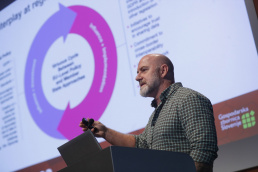
The formula for a successful healthcare system was discussed by Dr Tatjana Mlakar, Dr Bojana Beović, Dr Davorina Petek and Eva McLellan.
Dr. Tatjana Mlakar (ZZZS) is certain that the Slovenian healthcare system is based on a very good model, however, it has not been adapted to the rapidly changing circumstances of modern life. She sees opportunities for improving waiting times and greater efficiency in the functioning of subsystems, with each subsystem having specific responsibilities and autonomy.
Dr. Bojana Beović (Medical Chamber of Slovenia) estimates that the Slovenian healthcare system achieves similar results to stronger and larger healthcare systems in Europe. However, she believes that changes are necessary to keep up with the rapidly changing circumstances in society today. ‘On one hand, we have an ageing population, and on the other hand, we have new technology that residents and patients want to use to maintain their health.’, she said.
Dr. Davorina Petek (ZZ Zdravje Ljubljana and Kirurgija Bitenc) highlighted the problem of the shortage of family doctors, which is a European problem, not unique to Slovenia. The multi-disciplinary treatment of patients can be improved by using other health professionals to take over certain treatments instead of using only doctors. For her, the most important factor is that every patient can have access to a primary level of healthcare.
Eva McLellan (Roche Slovenia) says that the Slovenian system has many positive similarities with healthcare systems in Belgium, Canada and Switzerland. She also rates the Slovenian healthcare system as good. She also points out that primary-level care is an example of the standard model used in Central Europe and one on which we should build. She also reiterates that Slovenia’s main advantage is its small size, which allows for controllability and opportunities for improvement.
The moderator of the round table was Petra Juvančič (Management Association).
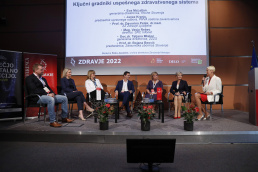
Milan Obradović, Tomaž Gornik, Milica Gregorič Kramberger and Urška Močnik spoke about recent breakthroughs in healthcare.
Milan Obradović (Roche Slovenia) presented the example of the use of advanced diagnostics for lung cancer, which is one of the main causes of mortality in Slovenia. In the majority of cases, the disease is only diagnosed at the irreversible fourth stage. The main reason for that is the late diagnosis, and the solution is in the use of early diagnostics and enhanced accessibility for patients.
Tomaž Gornik (Better) explained how they established a digital data access system for all healthcare stakeholders in the UK, seven months ago. The benefit of the system is that the data is centralised, thereby enabling everyone to have access to the same data at the same time. He also said that due to its small size, Slovenia has a great advantage, as it can introduce and implement innovations quickly that can improve the healthcare system. Lack of money has always been a problem up until now, however, now Slovenia has access to European funds, which is proving a great benefit.
Milica Gregorič Kramberger (UKC Ljubljana) said that we need to build up good and effective cooperation, help from the local environment and information on which patients should be contacted. We need a holistic approach based on data and cost analysis, which, unfortunately, is not possible now.
Urška Močnik (Idrija Retirement Home) highlighted the infrastructural problem, which manifests itself in the overcrowding of homes for the elderly. She also mentioned the attitude towards care home residents during the epidemic as a major problem. According to Urška Močnik, the standard of single rooms in retirement homes should be the same in Slovenia as it is in other European countries.
The moderator of the round table was Barbara Matijašič (Institute for Strategic Solutions).
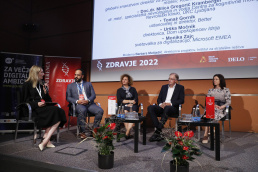
The last part of the conference was devoted to opportunities to promote health in the workplace. Speakers of the last round table were Dr. Maja Fesel Kamenik (HRM One and Beep Institute), Dr. Zala Kuret (URI Soča) and Darko Đurić (para-athlete and entrepreneur). They all agreed that a healthier environment and society can be achieved by setting examples, both in the family and in schools, through adherence to proper nutrition and exercise. Employers also have an important role to play, and they should do more to invest in the health of their employees.
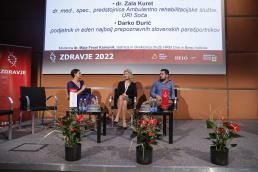
Until we change our habits, we cannot talk about change
Sustainability
editor
Team Adriatic
September 6, 2022 – The Institute for Strategic Solutions (ISR) held the first regional Net-0 event From Words to Actions. The main theme of the event was a discussion on how to implement substantive activities and business processes into companies and organizations that will benefit the environment, and won’t contribute to the carbon footprint. In attendance were the ISR, and representatives from the event's co-organisers, as well as the companies - Petrol, Resalta, Elektro Maribor and NLB. Together they discussed which strategies and actions would be most effective in the implementation and drive towards green transition.
“The trend towards green transition has been around for some time now, however, the geopolitical situation we are currently facing is new. I believe that the common denominator of all the issues raised and the future itself is technology. We have a lot of technology available today to help accelerate decarbonization. However, I am convinced that the main driving force for the future of humanity and real changes in collective integrity will be based on individuals changing their lifestyles,” said Jože Bajuk, a member of Petrol Group’s management board. Blaž Brodnjak, Chairman of the board of NLB, is also convinced that responsibility does not start with companies, but with each individual. “Until we change our habits, we cannot talk about change . We need a focus, a clear vision and clearly defined priorities. But everyone has to start with themselves, in their everyday life”. Brodnjak added.
The unique feature of the Net-0 event was in its execution, as all activities were environmentally friendly and operated with the lowest possible carbon emissions. The co-organizers of the event were the Ministry of Foreign Affairs of the Republic of Slovenia and the public agency, Spirit. The Municipality of Maribor hosted the event. Maribor has been a leading example of how a local municipality shows positive action and direction on the road towards good environmental initiatives.
“We can all physically feel the effects of climate change on our skin, and I hope that this awareness will cause a positive shift to a green transition at all levels – that is, at the global, regional, state and local levels of organizational and business activities and processes,” said State Secretary Samuel Žbogar at the start of the event.
“A carbon-free future may have seemed like a distant dream years ago, but today it is clear that we need to act as a society and that by taking decisive steps we can influence what kind of future we will shape for ourselves and our descendants. Today’s participants consisted of partners and companies that all understand the importance of green transition and actively strive for it. “This is proof that we are taking steps in the right direction,” said Tine Kračun, Director of the Institute for Strategic Solutions (ISR), in his address to the participants. “ISR, together with the co-organizers, the Ministry of Foreign Affairs and the public agency Spirit, have successfully launched the first Net-0 event in the region.’’
“When we talk about the green transition, it sometimes seems that we are behaving like an elephant in a china shop. Data shows that the topic of so-called greenwashing has exploded in recent years. Just talking about being carbon-free is not enough. For this event, we developed a methodology that complies with ISO standards and they have been implemented in various scenarios throughout the organization and execution of this conference. When documenting and talking about these activities, it is essential to adhere to the principle of transparent, consistent and accurate collation of information, in conjunction with transparent reporting.” Dr. Jure Stojan, Director of Research and Development at ISR, said in his speech.
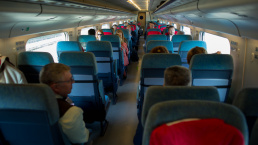
The Green Transition must be Coordinated with the Transformation of the Economy
Representatives from powerful and successful companies alongside regional players discussed how companies should approach the green transition and what steps they must take to achieve their goals. They presented solutions to the most common dilemmas and challenges they are currently facing. The discussion was also about the questions of who, what and how companies should deal with carbon neutrality and how to measure the effectiveness of steps taken to create a common living space that is significantly less harmful to the environment – and ourselves.
Given the current geopolitical situation and multi-level crisis created by the war in Ukraine and the related challenges in the field of energy supply and climate change on one hand, and our goals to save the environment on the other, one of the key questions is how will the economy adapt to these new conditions? And in addition – how long will adaptation to the constantly-changing conditions take? And to what extent is it even feasible?
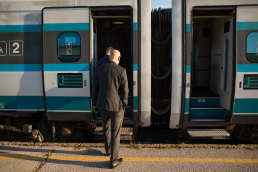
Quality of Life is the Guide, and Technology is the Tool
According to Jože Bajuk MA, a member of Petrol Group’s management board responsible for the Energy and Solutions development pillar, the situation related to the Russian invasion of Ukraine, has revealed a dependence on fossil fuels and that this is a very complex issue as it conflicts with the current concept of the green transition.
‘The geopolitical situation we are now facing, however, is new, and I believe that the common denominator of all the issues raised as well as the future lies in technology. We have a lot of technology available today to accelerate decarbonization. Nevertheless, I am convinced that the driving force for humanity and real changes in morality will be based on the integrity and lifestyle of each individual.”
Tomaž Orešič, the procurator of Resalta, who deals with energy solutions, added: “It is important to increase resistance to price fluctuations – Europe has decided to invest in renewable technologies and there is no other way forward. What can the industry do? First, it must reduce consumption wherever possible.”
How can Companies React and Adapt to the Changed Conditions?
In line with the goals of the Paris Agreement, EU member states have agreed to strive to make the EU the first climate-neutral economy and society by 2050 and the EU has committed to reducing emissions by at least 55% (compared to 1990) by 2030. So far, calculations show that we are still far from the set goals, which means that we will most likely not be able to stop global warming within the set time frames.
Blaž Brodnjak, Chairman of the Board of NLB, is convinced that responsibility does not start with companies, but with each individual. “Until we change our habits, we cannot talk about change.” Brodnjak added, “We need focus, a clear vision and clearly defined priorities. But everyone has to start with themselves, in their everyday life”.
Jože Hebar, director of Elektra Maribor, pointed out an example. “We are facing a large increase in demand and interest in electrical devices that customers want to place on their roofs. This is a clear sign that due to the vulnerability of electricity, we need to find new alternatives.”
“At NLB, we are committed to sustainability within the organization of the company and also in the performance of our own activities,” emphasizes Blaž Brodnjak. “For example, we support working from home, which is consistent with a smaller need for workspace, we support the United Nations principles for responsible banking and we have stopped supporting all companies whose businesses are tied to the consumption of coal.”
The conversation was moderated by Večer newspaper journalists Andreja Kutin and Mitja Sagaj.
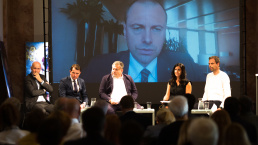
A Unique Event in the Region
In addition to the fascinating content, the most significant feature of the From Words to Actions Net-0 event was its design and implementation. ISR designed it in such a way that it followed the principles of locality, expedient logistics and low-carbon emissions, where they actively used digital tools and which did not cause a significant impact on the environment, as a result, the event placed less carbon burden on the environment.
Thanks to Slovenske Železnice, participants and guests arrived at the event by public transport – train. At the main train station in Ljubljana, they boarded the train to Maribor at 8 a.m. During the journey, they received digital links to interesting ad relevant content that they could read on their laptops, and at the event, food and drinks were served from local suppliers. At 10 a.m., Saša Arsenovič, the Mayor of the Maribor Municipality, welcomed the participants and guests at Maribor’s main railway station. Maribor has been a leading example of a local area with proactive and successful environmental practices. The participants and guests then rode their bikes towards the Minorite Church, where they attended the first regional Net-0 event.
The event was also attended by 23 diplomats and delegations from foreign embassies. The event was supported and co-organised by the Ministry of Foreign Affairs of the Republic of Slovenia and the public agency, Spirit.
Photos by courtesy of Matej Pušnik (ISR).
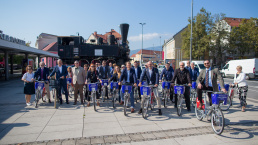
There are changes that companies should adopt with a sense of urgency
Sustainability
editor
Barbara Matijašič
JOURNALIST AT THE ADRIATIC
Gecić Law is a prominent regional law firm that helps clients navigate through the complex legal landscape of the region across multiple practice areas. It is especially known for its expertise in EU law and international trade - Gecić Law is the only regional law firm that has continuously represented clients in crucial matters before international institutions, including the European Commission, the Energy Community, the ECAA, and CEFTA. We spoke to Branko Gabrić, a counsel at Gecić Law about legislative framework to combat climate change.
How can the Net Zero Conference inspire your practice?
It was a pleasure to take part in the conference. We advise clients across the Adria and Balkans region and beyond, which includes both EU accession and member countries. EU law is therefore the backbone of most of our activities. Regardless of the type of client, specific mandate or jurisdiction, we are increasingly guided by developments in EU law, which are becoming increasingly relevant across the board. This includes EU’s legislative framework to combat climate change – the Fit for 55 legislative package, which is taking shape, as its ramifications will affect many aspects of business and law. In this sense, the Slovenian experience is especially interesting as perhaps our closest gateway to EU’s best practices and the conference provided a thorough insight and inspiration for our work. The conference was also an excellent opportunity to discuss this important topic with people who deal with it from different aspects and learn from their experience. I am deeply convinced that your conference created an enjoyable background for a prolific exchange of knowledge and different views, in which we were more than happy to participate and contribute.
In your opinion, what are the main challenges for the region on the path to net zero emissions?
Challenges in our region are numerous. At the level of countries, economies and the region as a whole, major steps lie ahead to change the energy mix as it remains heavily reliant on coal. Major plans for investments in renewable energy in the coming decades are being announced to catch up with EU plans, which are aiming for a 55 percent emissions reduction by 2030 and reaching net zero by 2050. To achieve this, another important challenge for the countries of the region is to introduce carbon pricing systems and viable emissions trading schemes, which are in line with the systems that have already been in place in the EU for many years. At the level of businesses, the biggest challenge will be to successfully incorporate the inevitable need to reduce carbon emissions into their strategies and adjust their business models to accommodate this overarching objective. For many companies, this will require significant changes which begin with a fundamental shift in strategic priorities and an entirely new approach to business. And these changes should take place with a sense of urgency, as there is not much time left.
What types of projects is Gecić Law currently working on in the field? Are they industry specific? If yes, how? If no, why not?
We are closely following the developments with one of the aspects of the Fit for 55 package that, once implemented, is likely to have an immediate and direct effect on the regional economies and this is the Carbon Border Adjustment Mechanism (CBAM). Dubbed the “carbon tax”, CBAM is a levy that the EU is aiming to introduce on the imports of products that generate high emissions in their manufacturing processes. This way, the EU is hoping to achieve a level playing field on the internal market. Regarding products manufactured in the EU, they already have to pay for carbon emission allowances under the unions ‘ emissions trading system. The introduction of the CBAM is likely to mark a tectonic shift in international trade that will affect whole supply chain including manufacturers, customers and consumers. Planned to be phased in starting 2023, the CBAM will initially include cement, steel, fertilisers, iron, steel, aluminum, and electricity from coal etc., but is likely to have a spillover effect on the costs of any finished goods that use these as components in their production processes. Our firm is advising on the multi-layered work that will be required both from governments and businesses to address these changes.
From a broader perspective, we are also working on some of the largest, most interesting and innovative renewable energy projects in the region. This field will see significant growth in the coming years and we are pleased that our team has the strength of expertise and unparalleled experience to fulfill the most demanding requirements in the area. We are looking forward to offer our knowledge and practice supporting our clients in diversification their energy portfolio to renewables, which could have many positive effects not only for their business but for our healthier environment.
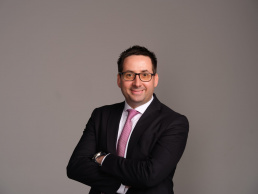
How are legislative developments such as EU’s CBAM likely to affect companies in the region?
The economies of the Western Balkans are likely to be significantly affected by the introduction of CBAM. The EU accounts for nearly 70 percent of the region’s exports and products potentially affected by CBAM are an important part of the economy. The levy is likely to affect pricing and, therefore, the competitiveness of products imported into the EU market. A lot of work still needs to be done across the region to mitigate these risks. The process also involves both governments and lawmakers, who will take steps to ensure there is a basis for the introduction of functional local carbon emissions exchange systems, and businesses, that must be much more conscious of the impact of their production processes and the financial costs of their CO2 emissions that they will soon have to deal with. Failing to act on both ends may have far-reaching implications for the economies of the region. A firm renowned for its expertise in EU law, Gecić Law is proud to be the only law firm in the region with the experience and expertise to advise both sovereigns and affected companies on this highly specific and complex set of issues.
What is capacity of EU to support green transition on global level?
It is widely recognized the position of EU as a leader in green transition on global level. This is where proposals like CBAM helps to provide more structural market that is still looking to define itself at larger scale. By imposing environmental policies like carbon tax on imports via the CBAM the EU hopes to affect external change, by driving change from the inside-out. The powerful single market of the EU could have serious impact when it comes to conversation regarding the carbon and climate. EU through enacting environmental regulations that influence the global business stage raises standards all across the world. Due to factors including the size of internal market and its importance on global level, businesses who trade worldwide may discover that maintaining lower standards in non-EU markets is not convenient from an economic, legal, or technical standpoint.
ESG is another hot topic. What should be the main focus for businesses in the region to comply with new trends?
ESG is a very closely related but an even broader topic. The main challenge is that many businesses still take a short-term approach, seeing adherence to ESG standards as a “nice-to-have” voluntary action, rather than a strategic business shift. However, failing to prepare and adapt may soon significantly affect their ability to compete in the market, sell their products and have access to financing. Regulators, investors, creditors, customers, and other key stakeholders will increasingly insist on responsible business conduct in these vital areas.Therefore, we help our clients by closely monitoring government policies updates and have a smooth channel to communicate with government authorities with aim to fully comply their business with most recent developments in environmental policies. Beyond the reputational impact, many of these standards are becoming mandatory. As the region moves on in its EU accession process, we advise clients on emerging EU rules on ESG that are likely to define the business environment in the years to come, and how this may impact the Western Balkans.
As one of the few independent law firms advising in this area, we aim to provide bespoke solutions, taking into account the specific position and needs of each enterprise. We carefully analyze both the risks and benefits and prioritize our advice on how to best adapt from a regulatory, strategic, financial and operational standpoint.
You have a wide range of experience in the field of ESG - do you have any thoughts or advice for companies and organisations in the context of greenwashing?
It is most important that businesses take a long-term, strategic view of ESG considerations and understand how ESG standards can help their business adapt and grow. Greenwashing is a practice aimed at achieving short-term public relations or marketing gains. Ironically, as we have seen in many examples, greenwashing may have truly harmful effects and destroy the reputations of businesses. The truth is businesses will quite simply no longer be able to afford to greenwash as the regulatory framework develops. Even more importantly, key stakeholders are increasingly becoming aware and active, and are no longer willing to accept corporate behavior which does not adhere to standards in these areas. And they are especially sensitive to businesses being untruthful about their practices. This does impact enterprises in our region sometimes more than they realize.
In your opinion, how can companies and organisations contribute their fair share to carbon neutrality? Do you believe "the silver bullet" exists?
There are no simple solutions and ready-made recipes. Each company needs to look not only at the totality of its operations but increasingly at its supply chain and carefully balance and incorporate solutions. There are no silver bullets as every option has its advantages and disadvantages, and these need to be carefully weighted. From the perspective of our region and profession, it is also up to regulators and lawmakers to set the framework and define standards, a process that is gradually coming to fruition. At least for the moment, one must also take into consideration the current energy crisis and its potential effects on the path to net zero. At the same time, we should always keep in mind that ultimately there is no alternative but to persevere, as fundamentaly this is an existential issue for humanity as a whole.


Walk the Talk: The First Regional NET-0 Event
Sustainable Future
editor
The Adriatic Team
CONTRIBUTOR
On 6 September 2022, the Inštitut za strateške rešitve (ISR) is organising a first regional NET-0 EVENT. Its focus will be the most pressing topic of our times: climate change. We will discuss how both companies and individuals can contribute to climate change mitigation and the reduction of greenhouse gas emissions. Only by working together, can we succeed.
The purpose of the event is to connect representatives of corporations and companies, politicians, non-governmental organizations, international agencies, innovators of breakthrough solutions and representatives of the financial community. The CEO Panel will focus on carbon neutrality and zero emissions, since virtually all major stakeholders and partners agree that they are the key elements of the future. However, strategies differ and rarely apply to entire organizations with their supply chains, which presents unique challenges. Our aim is to offer insights about ideas and integrated solutions – and to build bridges between potential partners.
The event is co-organised together with the Slovenian Ministry of Foreign Affairs and SPIRIT Slovenia – public agency of the Republic of Slovenia for the promotion of entrepreneurship, innovation, development, investment and tourism. It will take place at the Minorite Church and Monastery in Maribor (Vojašniški trg 2, 2000 Maribor), on 6 September 2022.
Please register HERE to join us on 6 September 2022 in Maribor, Slovenia.
WALK THE TALK: THE FIRST REGIONAL NET-0 EVENTHow can organisations contribute proactively to carbon neutrality?
In September 2022, the Institute for Strategic Solutions (ISR) is planning a NET-0 EVENT business forum. It will focus on the most crucial issue of our times – climate change. We will discuss ways in which both companies and individuals can mitigate the effects of climate change and reduce greenhouse gas emissions. The purpose of the event is to bring together key representatives from companies, politics, NGOs, and international agencies, together with innovators of breakthrough solutions and the financial community in a combined effort to try and find solutions to this serious and impending crisis.
Only by working together, can we succeed.
All relevant stakeholders agree that carbon neutrality and net-zero emissions are our key goals for the future. However, sectoral strategies vary, and seldom address the whole problem by failure to adequately align supply chains to their stategy, and by omitting to include the problems of transition – both of which are significant challenges. Therefore, we will aim to highlight these issues, through a series of articles from different platforms, prior to the business forum. Our obective is to equip readers with access to new ideas, good practice and integrated processes that are environmentally responsible and proactive in their quest for a positive future with net-zero emissions by 2050.
The Future for Our Energy Is Smart and Green
Sustainable Future
editor
The Adriatic Team
CONTRIBUTOR
Have you ever asked yourself what life without (or with limited access) to the electricity would be like? You press the switch and nothing happens. It seems like a scenario of a movie where the world just stopped.
Electricity is like food and water for people living in 21st century and is an essential power that drives our daily lives and our businesses. With the growing human population and growing need for electricity in our lives, throughout the history we have discovered many ways for its production (e.g., fossil fuels, nuclear energy, wind turbines, solar and hydro energy).
But one of the major challenges the world has been facing in last years is how to generate more (and enough) electricity in an environmentally friendly and sustainable manner. We can find the answer in transition to green, producing fewer negative effects as with fossil fuels. Going green is also the answer when we consider changes in global energy markets and growing dependence on some resources.
Green energy: clean and renewable
Green energy is coming from natural resources like sun, water, wind, biomass, geothermal energy. It is renewable and clean, with a lowest carbon footprint possible. Renewable means that it comes from sources, constantly being naturally replenished (sun, water, wind) and clean means that it releases far less greenhouse gases and pollutants into the air. This is not just good for the planet but is also good for the health of people and animals that breathe this air. Great example of renewable, green and clean energy comes from wind, environmentally friendly, self-replenishing and non-polluting source. But not all sources are green. Power generation that burns organic material from sustainable forests may be renewable, but due to the CO2 produced in the burning process, is not necessarily green.
Slovenia produces around 85 % of its own electricity (and the demand on consumption side is growing), the rest is imported. Renewables play an important role in electricity generation, but with current consumption rising, in short term, they are not expected to become the only source. The structure of electricity use is constantly changing due to heat pumps, air conditioning and increased electromobility.
Now the main source of green electricity is water. Solar and biomass energy follow, with only a sample of wind power; even though wind has become the most important renewable source of electricity in the EU in 2017, displacing hydro.
Electricity distribution networks – backbone of the green energy transition
Electricity distribution networks are acting as an essential infrastructure for sustainable development and the backbone of the energy transition providing advanced electricity services as key to successfully implementing the transition to a low-carbon society. One of main challenges is to continue with heavy investments in reinforcing the distribution network, aiming to increase capacity and to integrate distributed resources. Also digitalisation of the network in order to enable new services for users, to limit peak demands, provide flexibility in usage and the automation of processes is needed. By creating a smart grid, we want to ensure that investments are made where they will have the optimal impact.
Embracing shift in consumer behaviour
Elektro Maribor d.d., the second largest electricity distribution company in Slovenia, is going towards smart and green future. Being able to provide as green electricity with the lowest cost and power loss in our distribution network as possible, our job is also to make our users aware of the importance of environmental care and the role of green electricity as well as to help them make informed sustainable decisions.
Climate change might be the most complex risk facing society today and customers want companies and organisations to empower them to make more sustainable choices that result in broader environmental benefit. The fact is that fossil fuels need to become a thing of the past as they do not provide a sustainable solution to our energy needs. By developing a variety of green energy solutions, we create a sustainable future for our energy provision, without damaging the world we all live in. Especially younger generations are increasingly likely to make purchase decisions based on values and principles. They are willing to pay more for sustainable products.
Using clean energy, act on climate, love nature are also just few of Good Life Goals*, set of personal actions that help everyone contribute to the UN Sustainable Development Goals, that have been shaped through a multi-stakeholder collaboration between educational institutions, governments, environmental organisations as well as UN Environment, UNESCO and WBCSD.
* https://sdghub.com/goodlifegoals/
WALK THE TALK: THE FIRST REGIONAL NET-0 EVENTHow can organisations contribute proactively to carbon neutrality?
In September 2022, the Institute for Strategic Solutions (ISR) is planning a NET-0 EVENT business forum. It will focus on the most crucial issue of our times – climate change. We will discuss ways in which both companies and individuals can mitigate the effects of climate change and reduce greenhouse gas emissions. The purpose of the event is to bring together key representatives from companies, politics, NGOs, and international agencies, together with innovators of breakthrough solutions and the financial community in a combined effort to try and find solutions to this serious and impending crisis.
Only by working together, can we succeed.
All relevant stakeholders agree that carbon neutrality and net-zero emissions are our key goals for the future. However, sectoral strategies vary, and seldom address the whole problem by failure to adequately align supply chains to their stategy, and by omitting to include the problems of transition – both of which are significant challenges. Therefore, we will aim to highlight these issues, through a series of articles from different platforms, prior to the business forum. Our obective is to equip readers with access to new ideas, good practice and integrated processes that are environmentally responsible and proactive in their quest for a positive future with net-zero emissions by 2050.
Telekom Slovenije Includes the Principles of Sustainability in Its Operations, Products, Services and Content
The Adriatic in Partnership with Telekom Slovenija
editor
Telekom Slovenije connects its users through a range of the most advanced ICT services and solutions. As the leading Slovenian provider of communication solutions, it continuously strives for the development and introduction of new innovative technologies. The Company continuously develops new services and solutions, has the best and most expansive network, and the most advanced technology, while it also ensures the best user experience and security. These are the foundations on which we are co-creating our common future, which will be largely based on the sustainable principles of operations.
Telekom Slovenije understands sustainable operations as the responsible management of the economic-governance, social and environmental impacts of its operations. The principles of sustainability are included in the Company’s operations, products, services and content to the greatest extent possible. The Company believes in simple and secure solutions, and acts prudently and responsibly in its everyday work to achieve that end, with the knowledge that it generates benefits with ICT. Benefits for the Company. Benefits for employees. Benefits for shareholders. Benefits for society. Benefits for the environment. Benefits for all stakeholders.
From all aspects of sustainability, the Company has set measurable objectives that include the provision of the most advanced technologies to the population, the treatment of employees with care, a responsible answer to events in the social environment and concern for energy efficiency. More than ten years ago, we aligned our sustainability reporting with the requirements set out in the GRI standards. Compliance is verified every year by external institutes.
To that end, special attention is given to concern for employees, as the Company is aware that satisfied employees are crucial to successful operations. The Company creates a stimulating and pleasant work environment, open to innovation and cooperation. Telekom Slovenije provides for continuous employee training and education in various areas, and introduces innovative approaches for empowering employees. The Company is active in the areas of health and the prevention of burnout, and upgrades employee remuneration and motivation systems. It dedicates special attention to young families, facilitates flexible working hours to simplify the balancing of work and personal obligations, and organises numerous activities to strengthen the employer brand and organisational culture in the direction of mutual cooperation. Telekom Slovenije’s success in this regard is confirmed by receipt of the prestigious international Top Employer certificate for 2022 awarded by the Top Employers Institute. That certificate represents an international professional standard in the area of recognising excellence in the practices that companies implement for their employees. Companies that receive the title of Top Employer are considered the most desirable employers and demonstrate their commitment to create the best possible work environment through excellent HR practices and employee development programmes.
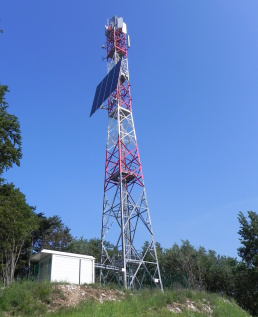
Telekom Slovenije is also the holder of the full Family-Friendly Company Certificate and the Socially Responsible Employer Certificate, and ranks among the ten most reputable employers in Slovenia.
Last but not least: Telekom Slovenije is the owner of Soline, which manages the Sečovlje Salina Nature Park, where the past and present still go hand in hand. Traditional manual salt harvesting, based on 700 years of tradition, is not just a special feature of the cultural heritage of Mediterranean Slovenia, but also provides the conditions for preserving the most important natural heritage of the Sečovlje saltpans. Important objectives include the protection of nature, the preservation of extraordinary natural and cultural values, the protection of indigenous, rare and endangered flora and fauna, natural ecosystems and the features of inanimate nature, and the preservation of and care for the cultural landscape. All activities are focused on ensuring compliant and sustainable development.
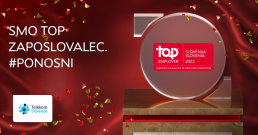
WALK THE TALK: THE FIRST REGIONAL NET-0 EVENTHow can organisations contribute proactively to carbon neutrality?
In September 2022, the Institute for Strategic Solutions (ISR) is planning a NET-0 EVENT business forum. It will focus on the most crucial issue of our times – climate change. We will discuss ways in which both companies and individuals can mitigate the effects of climate change and reduce greenhouse gas emissions. The purpose of the event is to bring together key representatives from companies, politics, NGOs, and international agencies, together with innovators of breakthrough solutions and the financial community in a combined effort to try and find solutions to this serious and impending crisis.
Only by working together, can we succeed.
All relevant stakeholders agree that carbon neutrality and net-zero emissions are our key goals for the future. However, sectoral strategies vary, and seldom address the whole problem by failure to adequately align supply chains to their stategy, and by omitting to include the problems of transition – both of which are significant challenges. Therefore, we will aim to highlight these issues, through a series of articles from different platforms, prior to the business forum. Our obective is to equip readers with access to new ideas, good practice and integrated processes that are environmentally responsible and proactive in their quest for a positive future with net-zero emissions by 2050.
Have You Already Seen the Interactive Map of Maribor - Environment and Health?
The Adriatic in Partnership with the Joint Municipal Administration of Maribor - Environmental Protection Service
editor
In 2021, the Joint Environmental Protection Service of the Maribor Joint Municipal Administration, the originator and leader of the project, in cooperation with the National Laboratory for Health, Environment and Food, the Geological Survey of Slovenia and the National Institute of Public Health, have developed an interactive online map called "Maribor - Environment and Health". The map allows citizens to access up-to-date data on the state of the environment in the municipality and its wider surroundings. The map also includes data on the health of the population in the area.
How it Works?
The website is user-friendly and visitors can easily find the information they are interested in on the map. They can access general information about the quality of water, air or soil on a scale ranging from – Good, Borderline, Warning to Bad – at any location on the map, as well as providing the specific values registered on the day of sampling, by simply clicking on the icon for water, air or soil. The user who requires more in-depth information can get an additional explanation of the data by clicking on the “i” mark.
In the future, we plan to upgrade the system with online and mobile user interfaces, to make the information accessible to users of all digital devices. The data and the developed indicators can be easily transferred to other platforms simultaneously, namely – mobile applications, other websites, digital billboards and various other information systems.
We will continue to upgrade the content of the system, which means that we will be able to include other parameters or indicators that relate to the state of the environment, as well as data on the state of health in the municipality. The content upgrade will be dependent on the environmental and health data available and will be on display to the general public.
We Collect Initiatives and Comments From the Public
We also want the participation of the general public in the design of the upgrades. Citizens can send their suggestions and comments to the e-mail address info.okolje@maribor.si, with the note “Maribor – environment and health”.
We will study the received initiatives and comments and meaningfully include them in the map with the aim of bringing it as close as possible to citizens and making its contents as useful, comprehensible, interesting and user-friendly as possible.
We expect that the system will significantly contribute to a higher level of citizens’ awareness of the state of the environment they live in and its impact on health.
The interactive map is available HERE.
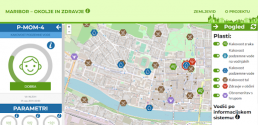
WALK THE TALK: THE FIRST REGIONAL NET-0 EVENTHow can organisations contribute proactively to carbon neutrality?
In September 2022, the Institute for Strategic Solutions (ISR) is planning a NET-0 EVENT business forum. It will focus on the most crucial issue of our times – climate change. We will discuss ways in which both companies and individuals can mitigate the effects of climate change and reduce greenhouse gas emissions. The purpose of the event is to bring together key representatives from companies, politics, NGOs, and international agencies, together with innovators of breakthrough solutions and the financial community in a combined effort to try and find solutions to this serious and impending crisis.
Only by working together, can we succeed.
All relevant stakeholders agree that carbon neutrality and net-zero emissions are our key goals for the future. However, sectoral strategies vary, and seldom address the whole problem by failure to adequately align supply chains to their stategy, and by omitting to include the problems of transition – both of which are significant challenges. Therefore, we will aim to highlight these issues, through a series of articles from different platforms, prior to the business forum. Our obective is to equip readers with access to new ideas, good practice and integrated processes that are environmentally responsible and proactive in their quest for a positive future with net-zero emissions by 2050.
A Guide to Sustainable Event Management - Some Examples, and How to Make Your Event More Environmentally Sustainable
Sustainability
editor
Carol Jardine
CONTRIBUTOR AT THE ADRIATIC
‘We do not inherit the earth from our ancestors, we borrow it from our children’ Native American Proverb
Slovenia is a trailblazer in the Green Scene, being named the world’s first Green Destination in 2016, voted the World’s Most Sustainable Country by National Geographic in 2017, and Ljubljana was acclaimed as Europe’s Greenest Capital in 2016, scoring 96% of 41 criteria including air quality, water and waste and green business.
Slovenia has become recognised as one of the most desirable green destinations in the world, and plays host to many festivals, music concerts, sports events and conferences, and therefore, requires to actively contribute to the rapidly evolving ESG guidelines for event management.
Festivals, music events and international sports events are making dramatic changes concerning sustainable venues and renewable energy, and together with conference organisers, they are also looking at green travel, locations, suppliers and supply chains.
Corporates
Companies in Slovenia are paying lip service to ESG issues but few appear to have established the all-important ESG Comittees necessary to devise their own specific ESG strategy. Positive moves to reduce paper useage are widespread, the option of working from home reduces Carbon emissions from car transport, many companies have eradicated the use of plastic cups, by using reusable cups and mugs , Slovenia’s enviable tap water is served at meetings and travel by foot and bicycle is actively encouraged – but is this enough?
It will hold panel discussions on how the insurance market, as an integral part of the Financial Services sector is taking proactive ESG steps to make Europe the first carbon- neutral continent.Guest speakers include many leading lights from Europe,including the new EIOPA chairperson, Petra Hielkema, Michaela Koller, Director General at Insurance Europe, Prof. Karel Van Hulle, KU Leuven and Goethe University Frankfurt and many other experts.
The panels will also look at the ‘ S and G factors’ at board level and amongst employees in the Insurance industry. Is there real gender equality , and the diversity necessary to bring in new perspectives? Are Human Rights issues considerd in investment policies and supply chains?
It will also discuss how the Financial Services sector is looking at assets held by insurance companies including the increasing predominance and active investment in companies who have transparent ESG strategies, and how they are dealing with ‘black’ companies, who have made written committments, and are currently undergoing transformations with the goal of carbon – neutrality by 2050.
The event is open to a wide audience, including policy makers and leaders in the insurance industry, and will try to find innovative solutions to current ESG issues and establish the insurance industry as a key player in the financial services sector and its attempts to make Europe the first Carbon-neutral continent.
Major European Events
Looking at some examples of big events in Europe, we can learn from their ESG strategies to save the planet.
Wimbledon
Wimbledon, UK, established in 1877, is the oldest, and most prestigious tennis tournament in the world. And quintessentially English, a tournament where the ‘tennis whites, all white’ players’ dress code still prevails. The 42,000 daily spectators are required to dress ‘smartly’, particularly on Centre and No 1 courts.
So how has Wimbledon adapted to ESG guidelines?
Wimbledon is a signatory to the UN Sport for Climate Action Framework with goals for reducing emissions to net zero through overall use of LED lighting; being resource efficient by reducing the resources used and increasing the proportion of recycled content, such as cups, cutlery and plates, and using stored rainwater to water the grass courts. It also aims to contribute to a net gain in biodiversity by 2030.
Wimbledon currently buys and uses renewable energy, they are installing LED lighting throughout the grounds, and use solar panels on indoor courts and at the Community Tennis Centre. They have replaced their fleet of petrol-fuelled VIP and hospitality cars and horticultural equipment with electric-powered vehicles. Wimbledon also promises to compensate for unavoidable emissions through forest protection schemes and offsets and to publish its Carbon emission scorecards publicly.
The World Athletics Committee
The World Athletics forum has implemented a ‘Sustainable Events Management System’ promoting ‘Athletics for a Better World’ by measuring adherence to their ESG goals. The scheme is being piloted in each of the 5 World Athletics series and offers Best Practice principles. They encompass the environment, suppliers, builders, sponsors and stakeholders and will become an integral part of the bidding and sanctioning process, making sustainability a key factor in how and where events are held – hopefully avoiding a repeat of the questionable choice of Qatar for the FIFA World Cup.
World Athletics have addressed the E and S challenges with a trial ‘Run Smarter City Challenge’, aimed at promoting physical fitness and raising awareness of air quality. It has also launched an educational e-module programme through webinars and talks, using notable international athletes’ platforms to distribute the message globally. It also promotes ‘Diversity, Inclusion and Wellbeing’, protects athletes from online abuse, and aims to engage a wider range of stakeholders in promoting the benefits of its ESG strategy.
The strategy follows a 10-year road map and hopes to promote sustainabilıty, sustainable production and consumption, reduction of carbon emissions, local environment and air quality, global equality and diversity, accessibility and wellbeing. Regular and transparent reporting of progress will be freely available to the public.
Music
In the music world, trailblazers include Radiohead, a UK band, who in 2007, introduced the concept of ‘green touring’ with their ‘pay what you want’ online album, ‘In Rainbows’, accompanied by the request that fans support The BigAsk Climate Change campaign.
Radiohead commissioned carbon footprint analysts to calculate their carbon footprint, and subsequently, have cut their carbon emissions, through lighting with LED, transporting their equipment using ships and trains, and using only recyclable materials and reusable tour merchandise. The band have actively promoted green travel to fans and crew – emphasizing carbon savings and asking their fans to leave their cars at home and travel ‘green’. It is estimated that 1/3 of all carbon emissions arise from fans and performers’ crew’s travel and 1/3 from the venue.
On the opera front, the renowned private opera venue, Glyndebourne, UK, encourages attendees to have traditional outdoor picnics on the grounds of its 1250-seat auditorium where it welcomes over 100,000 visitors p.a to the delights of modern and classical opera. A 67-metre high wind turbine was constructed in 2012, and its output now exceeds all its annual electricity needs, providing low-energy LED lighting in the auditorium and car park, controlled by timers and light sensors, as well as installing additional electric car charging points for customers and staff. Responsible waste management provides fertilizer for the gardens, and a ban on disposable cups has led to net-zero waste.
In Europe, there has been a general push towards sustainable music festivals, with an increase in hybrid concerts using interactive virtual reality streaming, ‘pay- what- you- want online albums, promotion of green travel, use of renewable energy and banning of plastic merchandise, cups and straws.
Will Hutton, British author and academic, says ‘The arts have an immensely powerful platform to help ignite social and legislative change. We need everyone to be involved – the live sector, recording companies, streaming partners and, of course, the artists.’
Conference centres, assisted by COVID 19, are adjusting to the hybrid conference, and centres such as Cankerjev Dom in Ljubljana, provide only Slovenia’s high-quality tap water at conferences, have reduced their consumption of natural resources, use local suppliers and organic food and only eco-friendly cleaning products. And, in my opinion, wins the prize for innovation, with its five rooftop beehives housing a population of 500,000 Carniolan honeybees. The bees aid biodiversity through pollination and promote apicultural heritage, leading to a UN endorsement of Slovenia’s Save the Bee Day initiative. Their annual honey production is between 40-100kg – and it’s excellent honey!
These are just a few examples of how ESG strategies can save the environment in the world of event management, be it sport, the arts or business, but to summarise, I think there are 5 key factors to consider.
1. Create an eco-friendly venue with LED lighting and accessible renewable energy from wind and solar panels.
2. Reduce and recycle food waste as fertilizer, use organic and seasonable food produce from local suppliers.
3. Use paperless communication and provide labelled trash bins.
4. Actively promote green travel options to performers, fans and attendees, such as carshare, public transport, and foot or bicycle for local venues.
5. And last, but not least, set up an ESG committee involving a cross range of stakeholders including attendees, suppliers and vendors, so that together they can create a strategy for a sustainable event that benefits all of us and our planet.
Actions speak louder than words!
WALK THE TALK: THE FIRST REGIONAL NET-0 EVENTHow can organisations contribute proactively to carbon neutrality?
In September 2022, the Institute for Strategic Solutions (ISR) is planning a NET-0 EVENT business forum. It will focus on the most crucial issue of our times – climate change. We will discuss ways in which both companies and individuals can mitigate the effects of climate change and reduce greenhouse gas emissions. The purpose of the event is to bring together key representatives from companies, politics, NGOs, and international agencies, together with innovators of breakthrough solutions and the financial community in a combined effort to try and find solutions to this serious and impending crisis.
Only by working together, can we succeed.
All relevant stakeholders agree that carbon neutrality and net-zero emissions are our key goals for the future. However, sectoral strategies vary, and seldom address the whole problem by failure to adequately align supply chains to their stategy, and by omitting to include the problems of transition – both of which are significant challenges. Therefore, we will aim to highlight these issues, through a series of articles from different platforms, prior to the business forum. Our obective is to equip readers with access to new ideas, good practice and integrated processes that are environmentally responsible and proactive in their quest for a positive future with net-zero emissions by 2050.
